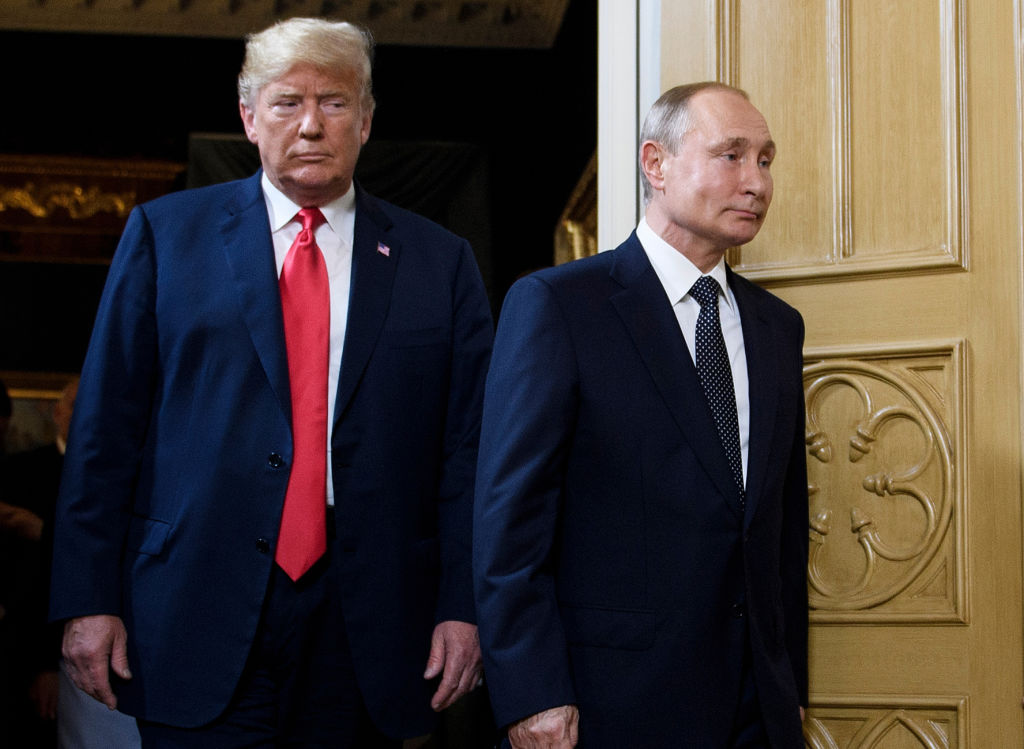Trump reportedly keeps threatening to pull the U.S. out of NATO. Coincidentally, that's Putin's No. 1 goal.


A free daily email with the biggest news stories of the day – and the best features from TheWeek.com
You are now subscribed
Your newsletter sign-up was successful
President Trump told aides numerous times last year that he wants to pull the U.S. out of NATO, essentially destroying the 70-year-old military alliance between the U.S., Canada, and Europe, senior administration officials tell The New York Times. Trump, who does not favor alliances, most frequently complains about European nations not spending enough on defense, portraying that as an unacceptable burden on the U.S.
Weakening or neutering NATO is perhaps the top geopolitical goal of Russian President Vladimir Putin, and Trump's "repeatedly stated desire to withdraw from NATO is raising new worries among national security officials amid growing concern about Mr. Trump's efforts to keep his meetings with Mr. Putin secret from even his own aides, and an FBI investigation into the administration's Russia ties," the Times reported Monday night. When Trump first brought up leaving NATO, "senior administration officials were unsure if he was serious," the Times adds, but:
Mr. Trump's skepticism of NATO appears to be a core belief, administration officials said, akin to his desire to expropriate Iraq's oil. While officials have explained multiple times why the United States cannot take Iraq's oil, Mr. Trump returns to the issue every few months. Similarly, just when officials think the issue of NATO membership has been settled, Mr. Trump again brings up his desire to leave the alliance. [The New York Times]
Withdrawing from NATO would be "a geopolitical mistake of epic proportion," retired Adm. James Stavridis, NATO's former supreme commander, tells the Times. "Even discussing the idea of leaving NATO — let alone actually doing so — would be the gift of the century for Putin." Former Under Secretary of Defense Michèle Flournoy concurred, calling the decision "the wildest success that Vladimir Putin could dream of." NATO has strong support in Congress, and if Trump decided to withdraw, lawmakers would have a year to try to block the move. Read more at The New York Times.
The Week
Escape your echo chamber. Get the facts behind the news, plus analysis from multiple perspectives.

Sign up for The Week's Free Newsletters
From our morning news briefing to a weekly Good News Newsletter, get the best of The Week delivered directly to your inbox.
From our morning news briefing to a weekly Good News Newsletter, get the best of The Week delivered directly to your inbox.
A free daily email with the biggest news stories of the day – and the best features from TheWeek.com
Peter has worked as a news and culture writer and editor at The Week since the site's launch in 2008. He covers politics, world affairs, religion and cultural currents. His journalism career began as a copy editor at a financial newswire and has included editorial positions at The New York Times Magazine, Facts on File, and Oregon State University.
-
 Is Andrew’s arrest the end for the monarchy?
Is Andrew’s arrest the end for the monarchy?Today's Big Question The King has distanced the Royal Family from his disgraced brother but a ‘fit of revolutionary disgust’ could still wipe them out
-
 Quiz of The Week: 14 – 20 February
Quiz of The Week: 14 – 20 FebruaryQuiz Have you been paying attention to The Week’s news?
-
 The Week Unwrapped: Do the Freemasons have too much sway in the police force?
The Week Unwrapped: Do the Freemasons have too much sway in the police force?Podcast Plus, what does the growing popularity of prediction markets mean for the future? And why are UK film and TV workers struggling?
-
 British warship repels 'largest Houthi attack to date' in the Red Sea
British warship repels 'largest Houthi attack to date' in the Red SeaSpeed read Western allies warn of military response to Iranian-backed Yemeni rebels if attacks on ships continue
-
 Houthi rebels claim Red Sea ship attacks
Houthi rebels claim Red Sea ship attacksspeed read Iran-backed Yemeni group vows to escalate aggression towards Israel-linked vessels in revenge for Gaza war
-
 Israel plans next phase of Gaza war as first hostages released
Israel plans next phase of Gaza war as first hostages releasedSpeed read After four-day ceasefire 'we will not stop' until destruction of Hamas, says Israel
-
 Mob storms Russian airport 'looking for Jews'
Mob storms Russian airport 'looking for Jews'Speed Read Plane from Israel surrounded by rioters chanting antisemitic slogans after landing in Russia's Dagestan region
-
 Tuberville's military promotions block is upending lives, combat readiness, 3 military branch chiefs say
Tuberville's military promotions block is upending lives, combat readiness, 3 military branch chiefs saySpeed Read
-
 Ukraine's counteroffensive is making incremental gains. Does it matter in the broader war?
Ukraine's counteroffensive is making incremental gains. Does it matter in the broader war?Speed Read
-
 US commissions first-ever Navy ship in a foreign port
US commissions first-ever Navy ship in a foreign portSpeed Read
-
 British spy chief, Wagner video suggest Prigozhin is alive and freely 'floating around'
British spy chief, Wagner video suggest Prigozhin is alive and freely 'floating around'Speed Read
